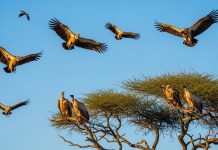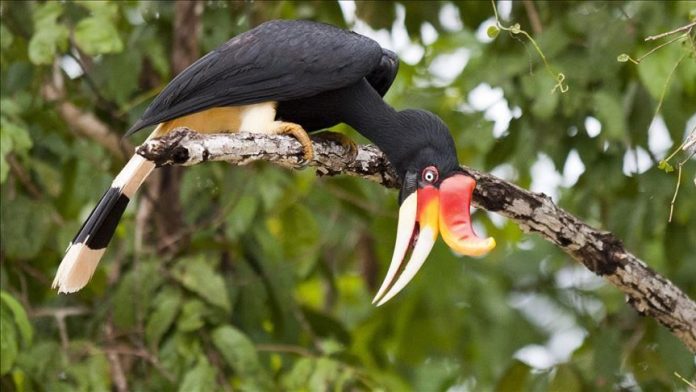Hornbills and other hornbill parts and products are being offered for sale on Thai-language Facebook groups even though the species is protected by national and international law, according to an international wildlife trade monitoring network.
TRAFFIC has released its latest report titled “Trading Faces” on the illegal online trade in hornbills, surveying Thai-language Facebook posts and closed groups from October 2018 to April 2019.
The report also details the demand for hornbill products and recommendations to tackle the illegal wildlife trade online.
“Eight main types of commodities were offered: whole casques, pendants, belt buckles, rings, necklaces, bracelets, taxidermy items and other individual pieces,” the report found by surveying 32 Facebook groups.
The research indicated some level of cross-border smuggling of such products, with the second-highest seller in the Thai group located in Malaysia and another trader located in Cambodia.
“A six-month online survey from 22nd October 2018 to 19th April 2019 found a minimum of 236 Facebook posts offering a minimum of 546 hornbill parts and products in 32 groups,” it said.
It is indicated that the trade was taking place despite the legal protection of nine species of hornbill under Thai law, such as the “Wild Animal Reservation and Protection Act” as well as international law such as the Convention on International Trade in Endangered Species of Wild Flora and Fauna (CITES).
“As part of Facebook’s continued efforts with the TRAFFIC, World Wildlife Fund (WWF) and International Fund for Animal Welfare (IFAW) facilitated Coalition to End Wildlife Trafficking Online, Facebook introduced a policy in April 2019 to ban the trade of all live animals,” the report said, mentioning efforts by NGOs and cooperation with Facebook on the issue.
To prevent online illegal trade and protect wildlife, the report said the public should continue to be encouraged to report wildlife crime, considering the ease of gaining access to groups that trade wildlife illegally.
Trade in hornbill parts or products is prohibited under Thailand’s Wild Animal Reservation and Protection Act B.E. 2535 (1992) (WARPA), which will be replaced by the revised law passed by the National Assembly on May 24, 2019 and comes into effect on Nov. 20, 2019, according to the report.
TRAFFIC is a leading non-governmental organization working globally on trade in wild animals and plants in the context of both biodiversity conservation and sustainable development.

















